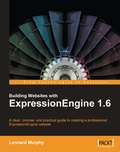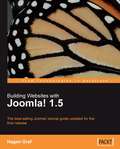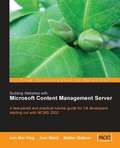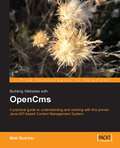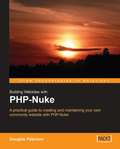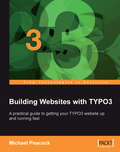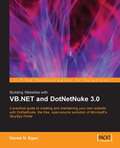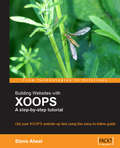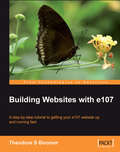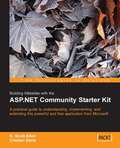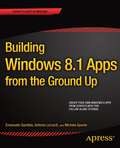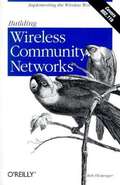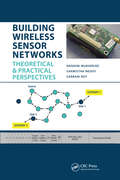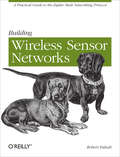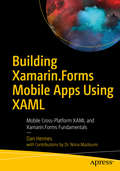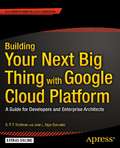- Table View
- List View
Building Websites with ExpressionEngine 1.6
by Leonard MurphyThis book is a clear and enjoyable tutorial packed with carefully explained steps for constructing the example website, and information for applying the skills learned to your everyday ExpressionEngine work. This book is ideal for new users of ExpressionEngine. The book is targeted at people who are responsible for creating and managing a site with ExpressionEngine. It is suitable for web developers, designers, webmasters, content editors, and marketing professionals who want to develop a fully featured web presence in a simple and straightforward process.
Building Websites with ExpressionEngine 2
by Leonard MurphyThis book is a clear and enjoyable tutorial packed with carefully explained steps for constructing a small business website, and information for applying the skills learned to your everyday work with ExpressionEngine. If you have familiarity with building websites using HTML/CSS or with software such as DreamWeaver or other content management systems such as Drupal, WordPress, Joomla!, or Plone, then ExpressionEngine may be what you are looking for. This book is suitable for anyone who wants to develop a fully featured web presence with a simple and straightforward tool. No prior knowledge of content management systems, PHP or ExpressionEngine is assumed. A basic understanding of HTML is necessary to follow the examples.
Building Websites with Joomla!
by Hagen GrafThis book focuses on taking you through the essential tasks to create a Joomla! site as fast as possible. These essential tasks are explained clearly, with well structured step-by-step instructions. The book does not aim to cover every feature of Joomla! nor is it a comprehensive guide to extending Joomla!. Almost everything in the book is accomplished without recourse to the underlying PHP code in which Joomla! is written. The book is very readable and the author has a particularly chatty and engaging writing style. This book is suitable for web developers, designers, webmasters, content editors and marketing professionals who want develop a fully featured web presence in a simple and straightforward process. It does not require any detailed knowledge of programming or web development, and any IT confident individual will be able to use the book to produce an impressive web site.
Building Websites with Joomla! v1.0
by Hagen GrafThis book focuses on taking you through the essential tasks to create a Joomla! site as fast as possible. These essential tasks are explained clearly, with well structured step-by-step instructions. The book does not aim to cover every feature of Joomla! nor is it a comprehensive guide to extending Joomla!. Almost everything in the book is accomplished without recourse to the underlying PHP code in which Joomla! is written. The book is very readable and the author has a particularly chatty and engaging writing style. This book is suitable for web developers, designers, webmasters, content editors and marketing professionals who want develop a fully featured web presence in a simple and straightforward process. It does not require any detailed knowledge of programming or web development, and any IT confident individual will be able to use the book to produce an impressive web site.
Building Websites with Mambo
by Hagen GrafThis book focuses on taking you through the essential tasks to create a Mambo site as fast as possible. These essential tasks are explained clearly, with well structured step by step instructions. The book does not aim to cover every feature of Mambo, nor is it a comprehensive guide to extending Mambo. Almost everything in the book is accomplished without recourse to the underlying PHP code in which Mambo is written. The book is very readable and the author has a particularly chatty and engaging writing style. This book is suitable for web developers, designers, webmasters, content editors and marketing professionals who want develop a fully featured web presence in a simple and straightforward process. It does not require any detailed knowledge of programming or web development, and any IT confident individual will be able to use the book to produce an impressive web site.
Building Websites with Microsoft Content Management Server
by Lim Ying Joel WardYears of active participation in MCMS newsgroups and mailing lists mean that the authors? hard-won experience puts them in the ideal position to tell you what you really need to know to master the system.An example site is developed throughout the book, at every point providing clear and practical demonstrations of the relevant ideas. Once you have mastered the basics, the book leads you onto more advanced and powerful techniques, allowing you to get the most from this awesome system.This book is written for developers who are part of a dynamic organization that has decided to evaluate or deploy MCMS and require the skills to make it happen.The book presumes a working knowledge of the .NET Framework and familiarity with the C# language, but no prior knowledge of MCMS is required. To use this book, you will need access to Visual Studio. NET 2002 or 2003, SQL Server 2000, and an installation of MCMS 2002.This book is not aimed at the specific information needs of administrators or users of MCMS.
Building Websites with OpenCms
by Matt ButcherIf you are a web developer new to OpenCms, or are an experienced OpenCms developer who is looking to get the most from the system, then this is the book for you. A working knowledge of Java, JSP, and XML is required to get the most from OpenCms, and from this book.
Building Websites with PHP-Nuke
by Douglas PatersonWritten in a clear, easy to read style, the book provides a tutorial on setting up a website with PHP-Nuke. Each topic is tackled in a clear, practical way with many examples to consolidate your learning. This book is written to help you create a fully-featured website as quickly as possible. Basic knowledge of HTML will help if you intend to explore customizing your own theme, and a basic knowledge of PHP will help if you want to get the most from the chapters on extending PHP-Nuke.
Building Websites with Plone
by First Middle Last4000 character max. If you are only providing one description, this is the preferred one.
Building Websites with TYPO3
by Michael PeacockWritten in a clear, easy-to-read style, the book provides a tutorial for setting up a TYPO3 website. Each topic is tackled in a practical way with many examples and tasks to develop your skills. This book is aimed at anyone who would like to quickly build a TYPO3 website. This book is written for first-time users of TYPO3 and has been specifically created so that you do not require detailed knowledge of programming or web development.
Building Websites with VB.NET and DotNetNuke 3.0
by Daniel N. EganYou can use this book to help you set up and administer a DotNetNuke portal, even if you have a limited knowledge of ASP.NET. You will learn how to setup and administer an example site, stepping through all the tasks to ease your learning. If you are a developer, this book will help you extend the DotNetNuke portal by first helping you understand how the core framework works and then show you how to create custom modules and skins. A rudimentary knowledge of VB.NET programming is assumed, but the emphasis is not on becoming a better VB.NET programmer but on taming DotNetNuke. This book has been written for both the beginner wanting to set up a website and also ASP.NET developers with a grasp of VB.NET and access to Visual Studio .NET. No prior knowledge of DotNetNuke is assumed. The new features of DotNetNuke 3.0 are discussed extensively, so even if you have worked with previous versions of DotNetNuke, you will find something new.
Building Websites with VB.NET and DotNetNuke 4
by Michael Washington Daniel EganYou can use this book to help you set up and administer a DotNetNuke portal, even if you have a limited knowledge of ASP.NET. You will learn how to setup and administer an example site, stepping through all the tasks to ease your learning. If you are a developer, this book will help you extend the DotNetNuke portal by first helping you understand how the core framework works and then show you how to create custom modules and skins. A rudimentary knowledge of VB.NET programming is assumed, but the emphasis is not on becoming a better VB.NET programmer but on taming DotNetNuke. This book has been written for both the beginner wanting to set up a website and also ASP.NET developers with a grasp of VB.NET who want a deeper understanding of how to work with DotNetNuke. To work with the DotNetNuke code, you will need access to Visual Web Developer Express or Visual Studio .NET 2005. No prior knowledge of DotNetNuke is assumed.
Building Websites with XOOPS: A step-by-step tutorial
by Steve AtwalWritten in a clear, easy to read style, the book takes you through the essential tasks required to create a XOOPS website as quickly as possible. Each task is tackled in a clear and practical way. This book is suitable for web developers, designers, webmasters, and marketing professionals who want develop a fully featured web presence in a simple and straightforward process using XOOPS. It does not require any detailed knowledge of programming or web development, and any IT confident individual will be able to use the book to produce an impressive web site.
Building Websites with e107
by Tad BoomerThis book is hands-on. As you work through the small business/e-commerce enabled example web site, you will learn how to install, upgrade, configure, and use the various basic features of the e107 Content Management System. The book contains a number of screen shots to reinforce that each step that you perform is correct. This book is primarily for entrepreneurs, small office/home office, small businesses and non-profit agencies who would like to have interactive, business and/or e-commerce web sites at a low cost without sacrificing power or usability. No knowledge of PHP programming, Apache, or MySQL is required.
Building Websites with the ASP.NET Community Starter Kit
by Cristian Darie K. Scott AllenThis book isn't written as a standard tutorial, it has been broken down into two halves to give you full understanding of the Community Starter Kit and then the confidence to create, administer and customize your own site. The second half of the book includes plenty of code, but the emphasis is firmly on guiding you through the techniques to create, extend and customize your own module. This book has been written for ASP.NET developers with a sound grasp of C# and access to Visual Studio .NET. This book uses the Visual Studio. NET version of the ASP.NET Community Starter Kit.
Building Windows 8.1 Apps from the Ground Up
by Emanuele Garofalo Antonio Liccardi Michele AponteThis book is the perfect introduction for anyone wanting to create sophisticated Windows 8 apps for the first time. Assuming only a basic knowledge of HTML and CSS we'll walk you through the development process using C# and VB. The book will familiarize you with the tools you'll need to use in order to make the most of Windows' stunning new features. You'll discover how to take advantage of the built-in functionality to create high quality user experiences. What you'll learn How to plan out your app and its user-experience The pros and cons of the different development languages available to you To build well-structured apps that can be easily customized and reused Manage data stores and cloud storage Why accessibility and globalization matter, even to the smallest of apps Use Windows 8's features to interact with the world around you Who this book is for This book is ideal for anyone with a little programming knowledge (basic HTML and CSS is all you'll need) who want to start creating Windows 8 apps. This book will walk you through everything you need to know in a results-oriented way and ensure your first Windows 8 apps built on firm foundations that you can be proud of. Table of Contents 1. Introduction to Windows 8. 1 2. Windows Runtime Environment 3. Designing the User Experience 4. Choose Your Way 5. Managing the Application Life Cycle 6. Start Up Your App 7. Take Advantage of the Environment 8. Data Management 9. Listening to the World 10. Accessibility and Globalization 11. Sell Your App 12. Live Tile and Toast Templates 13. Windows Store Developer Account
Building Wireless Community Networks
by Rob FlickengerBuilding Wireless Community Networksoffers a compelling case for building wireless networks on a local level: They are inexpensive, and they can be implemented and managed by the community using them, whether it's a school, a neighborhood, or a small business. This book also provides all the necessary information for planning a network, getting the necessary components, and understanding protocols that you need to design and implement your network.
Building Wireless Community Networks, 2nd Edition
by Rob FlickengerBuilding Wireless Community Networks is about getting people online using wireless network technology. The 802.11b standard (also known as WiFi) makes it possible to network towns, schools, neighborhoods, small business, and almost any kind of organization. All that's required is a willingness to cooperate and share resources. The first edition of this book helped thousands of people engage in community networking activities. At the time, it was impossible to predict how quickly and thoroughly WiFi would penetrate the marketplace. Today, with WiFi-enabled computers almost as common as Ethernet, it makes even more sense to take the next step and network your community using nothing but freely available radio spectrum. This book has showed many people how to make their network available, even from the park bench, how to extend high-speed Internet access into the many areas not served by DSL and cable providers, and how to build working communities and a shared though intangible network. All that's required to create an access point for high-speed Internet connection is a gateway or base station. Once that is set up, any computer with a wireless card can log onto the network and share its resources. Rob Flickenger built such a network in northern California, and continues to participate in network-building efforts. His nuts-and-bolts guide covers: Selecting the appropriate equipment Finding antenna sites, and building and installing antennas Protecting your network from inappropriate access New network monitoring tools and techniques (new) Regulations affecting wireless deployment (new) IP network administration, including DNS and IP Tunneling (new) His expertise, as well as his sense of humor and enthusiasm for the topic, makes Building Wireless Community Networks a very useful and readable book for anyone interested in wireless connectivity.
Building Wireless Community Networks, Second Edition
by Rob FlickengerBuilding Wireless Community Networks is about getting people online using wireless network technology. The 802.11b standard (also known as WiFi) makes it possible to network towns, schools, neighborhoods, small business, and almost any kind of organization. All that's required is a willingness to cooperate and share resources. The first edition of this book helped thousands of people engage in community networking activities. This revised and expanded edition adds coverage on new network monitoring tools an
Building Wireless Sensor Networks Using Arduino
by Matthijs KooijmanLeverage the powerful Arduino and XBee platforms to monitor and control your surroundingsAbout This BookBuild your own low-power, wireless network using ready-made Arduino and XBee hardwareCreate a complex project using the Arduino prototyping platformA guide that explains the concepts and builds upon them with the help of examples to form projectsWho This Book Is ForThis book is targeted at embedded system developers and hobbyists who have some working knowledge of Arduino and who wish to extend their projects using wireless connectivity.What You Will LearnInteract with XBee boards using the XCTU program on Windows, OS X, or LinuxMake your Arduino boards communicate wirelessly, using XBee modules in the advanced API modeCentrally collect and store measured sensor data, in the cloud or your own databaseConnect the coordinator Arduino to the Internet and send data to web servicesControl your environment automatically, based on sensor input from your networkInteract with off-the-shelf ZigBee Home Automation devicesMake your devices battery-powered and let them sleep to get months or even years of battery lifeIn DetailArduino has been established as the de facto standard microcontroller programming platform, being used for one-off do-it-yourself projects as well as prototypes for actual products. By providing a myriad of libraries, the Arduino community has made it very easy to interact with pretty much any piece of hardware out there. XBee offers a great range of low-power wireless solutions that are easy to work with, by taking all of the complexity of wireless (mesh) networking out of your hands and letting you focus on what to send without worrying about the how. Building wireless sensor networks is cost-effective as well as efficient as it will be done with Arduino support.The book starts with a brief introduction to various wireless protocols, concepts, and the XBee hardware that enables their use. Then the book expands to explain the Arduino boards to you, letting them read and send sensor data, collect that data centrally, and then even control your home from the Internet. Moving further more advanced topics such as interacting through the standard Zigbee Home Automation protocol, or making your application power-efficient are covered. By the end of the book, you will have all the tools needed to build complete, real-world solutions.Style and approachA hands-on guide, featuring a single home automation project that can be built as described or with endless variations. Every step is illustrated with complete examples and screenshots, allowing you to build the examples swiftly.
Building Wireless Sensor Networks: Theoretical and Practical Perspectives
by Nandini Mukherjee Sarmistha Neogy Sarbani RoyBuilding Wireless Sensor Networks: Theoretical and Practical Perspectives presents the state of the art of wireless sensor networks (WSNs) from fundamental concepts to cutting-edge technologies. Focusing on WSN topics ideal for undergraduate and postgraduate curricula, this book: Provides essential knowledge of the contemporary theory and practice of wireless sensor networking Describes WSN architectures, protocols, and operating systems Details the routing and data aggregation algorithms Addresses WSN security and energy efficiency Includes sample programs for experimentation The book offers overarching coverage of this exciting field, filling a critical gap in the existing literature.
Building Wireless Sensor Networks: with ZigBee, XBee, Arduino, and Processing
by Robert FaludiGet ready to create distributed sensor systems and intelligent interactive devices using the ZigBee wireless networking protocol and Series 2 XBee radios. By the time you're halfway through this fast-paced, hands-on guide, you'll have built a series of useful projects, including a complete ZigBee wireless network that delivers remotely sensed data.Radio networking is creating revolutions in volcano monitoring, performance art, clean energy, and consumer electronics. As you follow the examples in each chapter, you'll learn how to tackle inspiring projects of your own. This practical guide is ideal for inventors, hackers, crafters, students, hobbyists, and scientists.Investigate an assortment of practical and intriguing project ideasPrep your ZigBee toolbox with an extensive shopping list of parts and programsCreate a simple, working ZigBee network with XBee radios in less than two hours -- for under $100Use the Arduino open source electronics prototyping platform to build a series of increasingly complex projectsGet familiar with XBee's API mode for creating sensor networksBuild fully scalable sensing and actuation systems with inexpensive componentsLearn about power management, source routing, and other XBee technical nuancesMake gateways that connect with neighboring networks, including the Internet
Building With Ethereum: Products, Protocols, and Platforms
by Jamie RumbelowBuild products on top of Ethereum's new and expansive technological stack. Writing any good web application requires planning, care, and deft technical skills, but Ethereum's execution model presents its own challenges for engineers wishing to build applications on top of its smart contract layer. Building performant and engaging product experiences is one of the most important – and often underappreciated – roles in any company. This book looks at the full product stack needed to build such experiences on top of Ethereum smart contracts, weaving tutorials and case studies through more conversational discussions of the various constraints, trade-offs, and complexities involved in doing so. You’ll learn about the fundamentals of Ethereum from a new perspective, developing a strong understanding of how the Ethereum Virtual Machine (EVM) works and how it affects product engineering, as well as all the pieces of technology that go into decentralized apps (dapps) behind the front end: RPC nodes, wallets, indexers, application hosts, and more. You’ll be exposed to plenty of UI, JavaScript code, and idiomatic ways to bring on-chain data into your front ends. And you’ll be given up-to-date knowledge of the best practices and future possibilities that decentralized computation might offer the product engineer.What You Will LearnUnderstand the EVM and how it worksGain insight into smart contracts and how apps connect to themUnderstand the difference between live data and indexed dataHow decentralization affects the UI of applicationsBuild engaging, tasteful product experiences on top of EthereumWho This Book Is ForA confident – mid-level or senior – software engineer or web developer who hasn’t properly branched out into Ethereum; someone who might have scratched the surface, but wants a deeper understanding of the principles behind dapps, and who wants a head start on the hurdles faced while building them.
Building Xamarin.Forms Mobile Apps Using XAML: Mobile Cross-Platform XAML and Xamarin.Forms Fundamentals
by Dan Hermes Nima MazloumiLeverage Xamarin.Forms to build iOS and Android apps using a single, cross-platform approach. This book is the XAML companion to the C# guide Xamarin Mobile Application Development. You'll begin with an overview of Xamarin.Forms, then move on to an in-depth XAML (eXtensible Application Markup Language) primer covering syntax, namespaces, markup extensions, constructors, and the XAML standard. XAML gives us both the power of decoupled UI development and the direct use of Xamarin.Forms elements. This book explores the core of the Xamarin.Forms mobile app UI: using layouts and FlexLayouts to position controls and views to design and build screens, formatting your UI using resource dictionaries, styles, themes and CSS, then coding user interactions with behaviors, commands, and triggers. You'll see how to use XAML to build sophisticated, robust cross-platform mobile apps and help your user get around your app using Xamarin.Forms navigation patterns. Building Xamarin.Forms Mobile Apps Using XAML explains how to bind UI to data models using data binding and using the MVVM pattern, and how to customize UI elements for each platform using industry-standard menus, effects, custom renderers, and native view declaration. What You Will LearnCreat world-class mobile apps for iOS and Android using C# and XAMLBuild a UI decoupled from C# code and XAML Design UI layouts such as FrameLayout, controls, lists, and navigation patterns Style your app using resource dictionaries, styles, themes, and CSS Customize controls to have platform-specific features using effects, custom renderers, and native views Who This Book Is For XAML and C# developers, architects, and technical managers as well as many Android and iOS developers
Building Your Next Big Thing with Google Cloud Platform: A Guide for Developers and Enterprise Architects
by S. P. T. Krishnan Jose L. Ugia GonzalezBuilding Your Next Big Thing with Google Cloud Platform shows you how to take advantage of the Google Cloud Platform technologies to build all kinds of cloud-hosted software and services for both public and private consumption. Whether you need a simple virtual server to run your legacy application or you need to architect a sophisticated high-traffic web application, Cloud Platform provides all the tools and products required to create innovative applications and a robust infrastructure to manage them. Google is known for the scalability, reliability, and efficiency of its various online products, from Google Search to Gmail. And, the results are impressive. Google Search, for example, returns results literally within fractions of second. How is this possible? Google custom-builds both hardware and software, including servers, switches, networks, data centers, the operating system''s stack, application frameworks, applications, and APIs. Have you ever imagined what you could build if you were able to tap the same infrastructure that Google uses to create and manage its products? Now you can! Building Your Next Big Thing with Google Cloud Platform shows you how to take advantage of the Google Cloud Platform technologies to build all kinds of cloud-hosted software and services for both public and private consumption. Whether you need a simple virtual server to run your legacy application or you need to architect a sophisticated high-traffic web application, Cloud Platform provides all the tools and products required to create innovative applications and a robust infrastructure to manage them. Using this book as your compass, you can navigate your way through the Google Cloud Platform and turn your ideas into reality. The authors, both Google Developer Experts in Google Cloud Platform, systematically introduce various Cloud Platform products one at a time and discuss their strengths and scenarios where they are a suitable fit. But rather than a manual-like "tell all" approach, the emphasis is on how to Get Things Done so that you get up to speed with Google Cloud Platform as quickly as possible. You will learn how to use the following technologies, among others: Google Compute Engine Google App Engine Google Container Engine Google App Engine Managed VMs Google Cloud SQL Google Cloud Storage Google Cloud Datastore Google BigQuery Google Cloud Dataflow Google Cloud DNS Google Cloud Pub/Sub Google Cloud Endpoints Google Cloud Deployment Manager Author on Google Cloud Platform Google APIs and Translate API Using real-world examples, the authors first walk you through the basics of cloud computing, cloud terminologies and public cloud services. Then they dive right into Google Cloud Platform and how you can use it to tackle your challenges, build new products, analyze big data, and much more. Whether you''re an independent developer, startup, or Fortune 500 company, you have never had easier to access to world-class production, product development, and infrastructure tools. Google Cloud Platform is your ticket to leveraging your skills and knowledge into making reliable, scalable, and efficient products--just like how Google builds its own products. What you''ll learn * A brief introduction to Cloud Computing * Distinctive characteristics of Google Cloud Platform * The right way to do Authentication, Authorization to access Google Cloud Platform resources and user''s data * An overview of Google Cloud Platform technologies including compute, storage, networking, Big Data and application services. * Build, maintain and iterate over a backend infrastructure on Google Cloud Platform. * Optimize and scale existing projects on Google Cloud Platform. * Perform Big Data analytics using Google technologies. * Host web services in Cloud Platform and orchestrate complex applications with ease. * Architecture recipes using several Google Cloud Platform harmoniously Who this book is for Application Developers and Enterprise Architects seeking a robust and powerful cloud-hosted, backend, infrastructure for apps,...
